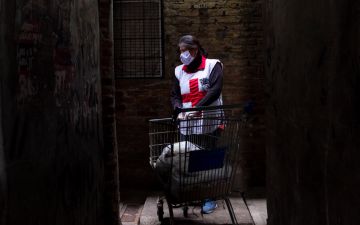Braving the impact of a nationwide lockdown and an exponential growth in COVID-19 cases, immigrant workers in the Buenos Aires slums are surviving through self-organization and solidarity.
Against a backdrop of an already-shambling economy, the COVID-19 pandemic is pushing immigrant communities—mostly from Peru, Bolivia, and Paraguay—to the edge since 58 percent of migrants have had no governmental aid or income since March 19, 2020.
Immigrants are core to Argentina and its history—at the turn of the 19th century, Argentina had the largest immigrant population after the U.S. And like in the U.S. currently, there is a growing anti-immigrant sentiment as evidenced by the government’s tightening of migration policies and of some media coverage that serves to increase stigmatization.
To challenge these representations and raise awareness about the emergency, Anita Pouchard Serra is highlighting the strategies of two community organizations, “Migrar no es delito" (Migration is Not a Crime) and “Frente de Organizaciones en Lucha” (Front of Organizations) as they confront the crisis through collective and solidarity actions around health, housing, and food. She is focusing on the stories of women leaders in the Bajo Flores neighborhood, the biggest slum of Buenos Aires.


